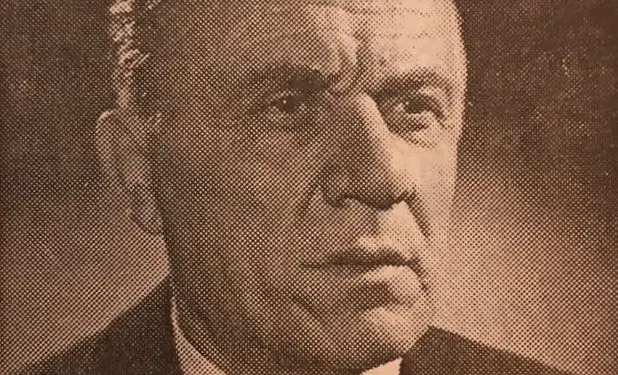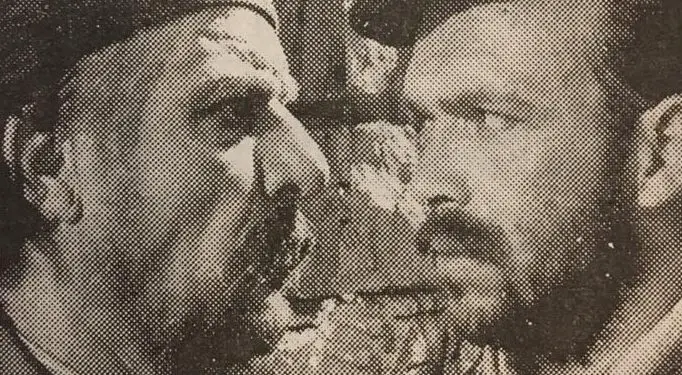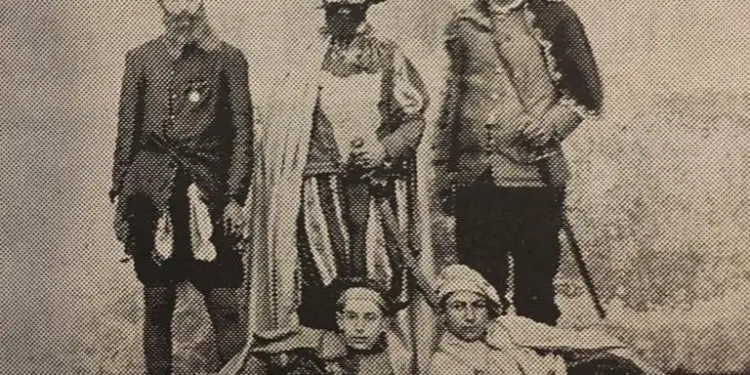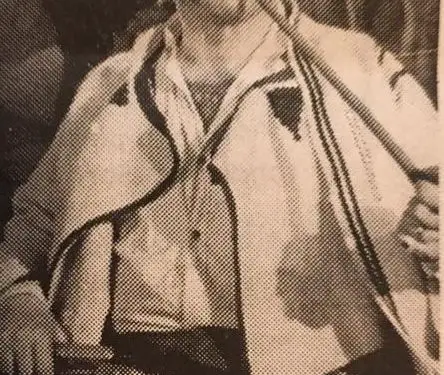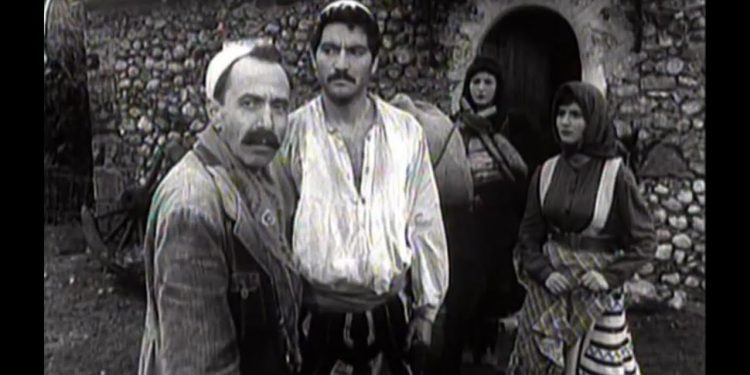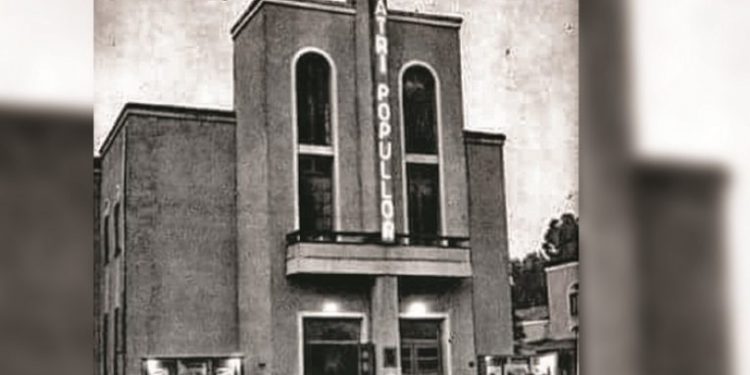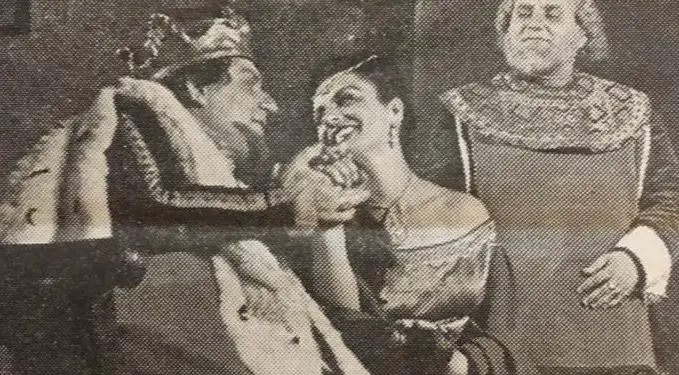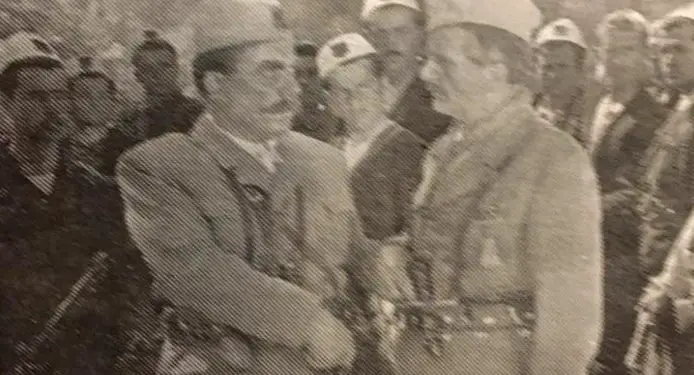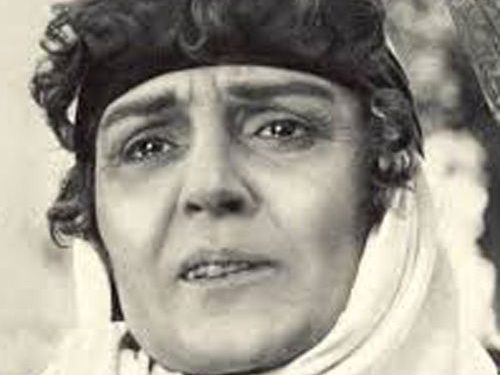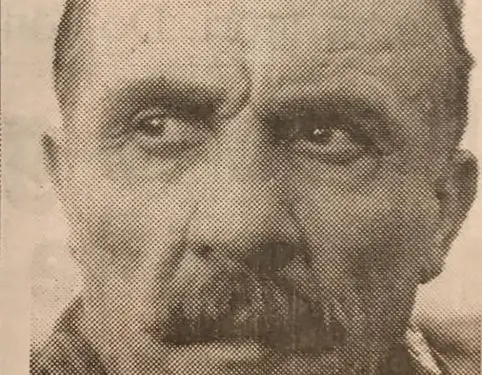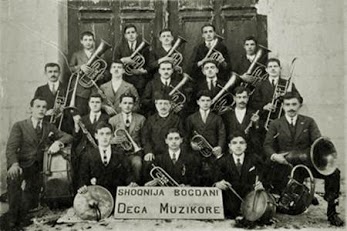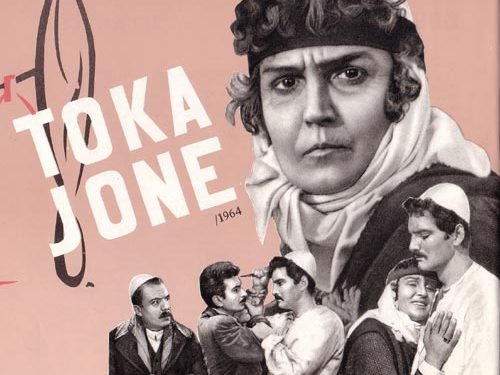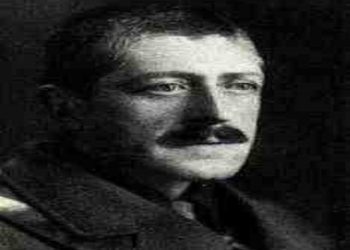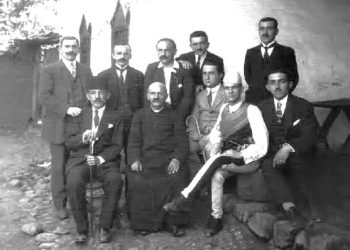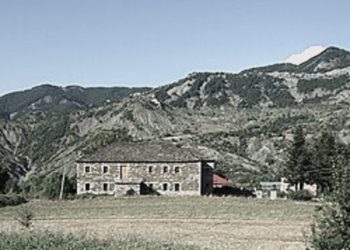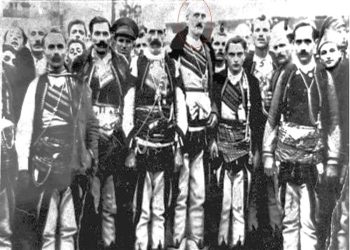Dashnor Kaloçi
Memorie.al publishes the unknown story of the famous actor of the Albanian theater and cinematography, “People’s Artist”, Loro Kovaçi, from his childhood in the city of Shkodra where he frequented the out-of-school districts that the Catholic clergy had opened, such as the Bogdani Theater ”Etc., and works as a tailor together with his mother, to provide the income with which the family was supported. The intervention of Fratel Pantalia sent him to Innsbruck, Austria where Loro enrolled in a two-year school for tailoring and its subsequent abandonment, as he was obsessed with the violin and theater. Loros returns to the city of Shkodra to become his mother’s right-hand man as a tailor and arrives in Tirana after the end of the war, where he and his close friend Tuk Jakova and his close friend became interested. , Pjetër Gjoka, became part of the first nucleus of the newly established People’s Theater, where he did not stay long after he was ceremoniously removed, after the arrest of his son, Gjoni, with groups of anti-communist youth in the city of Shkodra. Heavy work for several years in the Brick Factory and return to Tirana near the People’s Theater where he excelled in the first roles and feature films of Kinostudio “Shqipëria e Re”, where he played the lead roles. The rare testimony of his friend and colleague, Mario Ashiku, about the show given on the Measuring Coast where an old man got up from the hall and wanted to shoot him when Loro “Tuç Maku” pushed “Loken”, Marie Logoreci… ?!
Years ago, when the famous Italian actor Alberto Lupo was at the peak of his artistic career and played the role of a doctor, the next day the premiere of the film with dozens of different people stopped him on the street and congratulated him, wishing him well. a role that had amazed everyone. Among these people, the great actor was stopped near his house, and an elderly lady, who with tears in her eyes addressed him: “Doctor, please, my son is dying, do something because I am alone. Please, doctor, we have been so close to you and we have not known you. ” In more or less such circumstances with the famous Italian actor, one of the icons of the Albanian stage and cinematography, the great Loro Kovaçi, was found, from the mid-60s, when he was playing the role of Tuç Makut in the drama “ Our Land ”, in one of the villages of Bregu i Matës where the events of that work took place, considered as“ the peak of the dramaturgy of the period of socialist realism ”.
Difficult childhood
Loro Kovaçi was born on August 30, 1903 in the city of Shkodra, known in those years for the great personalities and figures he brought to the political and social life of the future Albanian state. Loros’ father, Gjon Kovaci, a nobleman, a little honest, worked as a craftsman in an old barracks in the Badrave neighborhood, with which he provided for his family. He young very died and his orphaned children (Loro was their eldest) were left alone with their mother, Kushen, a lady who raised them amidst many afflictions, from the poor who had plagued her. Kushja devoted herself to the tailoring profession, where she became famous in the city of Shkodra. Years later she managed to open a tailoring shop, employing several other tailors there. Unlike Gjoni, Kushja lived until 1965, always working in her profession, there in the center of Shkodra. With John’s death, in 1910, Kushja was forced to remove her eldest son, Loron, from school when he had not done more than 5-6 classes and to engage her in her tailoring shop to provide income. for the family. At that time, when John was alive, the Kovaçi family had a close family friendship with Fratel, Gjon Pantalia, otherwise known to the Catholic faithful of Shkodra, as Padre Gjoni, who was the economist of the Jesuit College of that city. To help the Kovaçi family, Fratel Gjoni took Loron to the Jesuit Assembly, enrolling him in tailoring courses. Loro stayed there, perfecting the profession he had first learned from his mother until he was 17 years old. When Loroja reached this age, Fratel John intervened with the leaders of the College of Jesus and sent him to Innsbruck, Austria, where he enrolled in a two-year school of tailoring, which was one of the most famous throughout the Austro-Hungarian Empire. In the city of Innsbruck, in addition to the tailoring course, Loroja also attended music instrument courses, for which he had weaknesses since he was in his hometown, Shkodra. In addition to music and sports, Loroja had a special desire and adoration for the theater and the great actors of that time. Taking advantage of the language he soon mastered, in the afternoons and outside the walls of the tailoring school, he enrolled in a violin course, from where he later joined a group of extremely talented young musicians, who occasionally gave concerts. various and outside Innsbruck. On the violin instrument, Loro was virtuoso and applauded, but that didn’t last long, as he abandoned her out of love for the theater stage, where she followed various groups from rehearsals to performances. For the two years he stayed in Austria, Loroja gained a great deal of experience, perfecting his talents in both music and theater, leaving no performances unattended.
From Innsbruck to Shkodra
In late 1921, after completing a two-year scholarship awarded by the Jesuit College, Loro returned to his hometown, but was now a professional, joining his mother, Kusha, in it. small but well-known store in Shkodra. At that time, Shkodra was one of the cities where, in addition to handicrafts and trade, cultural life occupied a special place in its hull. An important role in this regard was played by the Catholic clergy, who gathered school and city youth in various artistic and sports circles. Among the many societies of that city, at that time the society “Bogdani” was created, which dealt only with the theater. Loro Kovaçi and his two friends Pjetër Gjoka and Gjon Karma were among the first to participate in this theatrical society, who years later would be his main partners in dozens of roles in the Albanian theater and cinematography. In this theatrical society, Loro Kovaçi would convincingly affirm himself as one of the future talents of the Albanian scene, receiving evaluations from the leaders of the Catholic clergy who had deep knowledge in that field, as well as from the press of the time. One of these shows where Loros’ talent stood out was that of the drama “Governor of the Province”, in which he interpreted with deep artistic mastery the role of the Duke of Piedmont, part of which first appeared on March 1. 1925. After a series of performances of this theatrical society, Loro breaks away from it and approaches the other theatrical society “Rozafat”, which was a secular society, created by the young people themselves who had a passion for theater. The main director of this theater society and its director was from the beginning Henerik Lacaj (one of the later professors of Albanian stage art), who brought many talented young people to that society, were among them stood out Loro Kovaçi, Gjon Karma, Ndoc Meshkalla, etc. In the early 1940s, Loro began working as a caretaker in the “Our Mountains” dormitory to help support his family, earning a large portion of those students who would make a name for themselves. high of the Albanian state after the war. In this dormitory Loro worked for less than two years and left on his own request, as he refused to join the Fascist Party, where he was required to compel members of the state administration. After leaving the dormitory, he returned to his old tailoring profession, along with his mother, Kushen, who had already made a name for herself outside the city of Shkodra. Although Loro did not take part in the Anti-Fascist Movement, he was convinced that his departure from the “Our Mountains” dormitory was a sign. This was also rooted in Loro, from the great society he had with Tuk Jakov, one of the most important figures of the Albanian communist regime since the war, and later when he held the highest party and government positions and positions after Enver. Hoxha. The friendship between them had begun in the artistic circles of the Jesuit College, where both were learning musical instruments. After the end of the war in early 1945, with Tuk’s intervention, Loro was put to work in the first Shkodra Executive Committee, where he did not stay long.
From Tirana, a worker in Shkodra bricks
The reason for Loros’ departure from the administration of the Executive Committee was that he was called to come to Tirana as an actor at the Army Theater. So in 1946, he and his close friend and colleague Pjetër Gjoka began to play the first roles in that theater, which was considered the most important in the country, as work on the People’s Theater had not yet begun. One of his first roles was “Under the Chestnuts of Prague”. In this theater, Loro, along with Peter, worked for a short time after they were called to the newly established People’s Theater. In this theater, Loroja was not fortunate enough to work for more than a year and a half, as in 1947, Gjon Kovaçi, the son of Loros and Giuseppe (daughter of one of the most famous actors of comedy that Shkodra had, Zef Hilgega ) is arrested when he was in the third year of the secular gymnasium of Shkodra. In this class where Gjoni taught, a group of boys from the most anti-communist families of Shkodra had gathered, such as Ahmet Bushati, Xhevat Quku, Injac Serreqi, etc. This group of boys discussed the political situation of that period and their convictions contradicted the policy of the communist government of Colonel-General Enver Hoxha. “My friend Injac Serreqi and I made anti-communist propaganda and opposed the economic convention with Yugoslavia. In May 1947, we were both arrested and held for 10 months by the investigator. At trial we were accused of agitation and propaganda as well as UNRRA agents. We were sentenced to 5 years in prison, ”recalled John, Loros’ eldest son. After John’s conviction, Loro leaves the People’s Theater as the “father of the class enemy,” and is sent to work as a laborer at the Brick Factory in Shkodra. Before the departure was announced, the directorate was instructed to expose it to the public, in front of the entire collective. The director was the first to speak at the gathering, and in order to ignore Loron, he did not mention his name at all, but labeled him “the great actor.” Then someone else took the floor and said, “We didn’t know there was an enemy like us in our ranks.” At the Brick Factory, he worked for almost 2 years, without thinking that one day he would return to the theater, his old dream. With the intervention of Tuk Jakov, Loros’ old friend, John, he was able to get out of the prison where he had spent three years. After his release from prison, one of the main problems of the Kovaçi family was the possibility of Loros’ rehabilitation, to bring him back to the theater stage. With the intervention of Spiro Koleka (who had stayed as a tenant in this family in Shkodra) Loro was able to return to the theater stage.
Again at the popular Theater
Upon his return to Tirana in 1950, Loro set to work to “rehabilitate” himself from the blow he had received a few years earlier. In that theater, he became one of the main actors, constantly playing in shows that were given almost every night. Many of his colleagues who had unmasked him at the time became his most ardent “supporters” and began to keep him close. After Loro stabilized well in the theater, creating indisputable popularity, he brought from Shkodra to Tirana and his family, which he settled in an old barracks (where the Police Directorate is today) which had remained from War. Over the years, Loro increased his artistic personality, becoming one of the “leaders” of the Albanian scene. With the creation of the Kinostudio “Shqipëria e Re” in the mid-1950s, Loro participated in his first film, “Her Sons” and then two of the Albanian-Soviet co-produced films “Skënderbeu” and “Furtuna”… He then starred in director Kristaq Dhamo’s “Special Task,” playing one of the lead roles. The film was released shortly after one of the film’s co-writers, Interior Minister Halim Xhelo was arrested. In this regard, director Kristaq Dhamo testifies: “It was a pleasure to have Loron as an actor. In “Special Task,” he shone with his extraordinary grandeur and potential. “Since the beginning of Albanian cinematography, he had the bad luck to perform very little, because when he died.” Fadil Paçrami, one of the top leaders of that time who covered art and culture, said to Laros with a laugh: “We will not give you negative roles, because you are openly insulting us, communists.” Loros was given the opportunity only once to go abroad when he went to Moscow, with the film “Storm”, in which he played the role of a commander of the National Front. His roles in the theater include those of Othello, Senator Leighton, Bajram Curri, and Marash Palit. But his most prominent role was that of Tuc Makut in “Our Land” in drama and film, a role in which he was “identified” and continues to be remembered for his rare, even unique interpretation. In this regard, the director and other well-known actors of Albanian theater and cinematography Mario Ashiku, a colleague and close friend of his testify, among other things: “Loro and Tuç Maku are one. So if you say Loro, you say Tuch Maku, and if you say Tuch Maku, you say Loro. That interpretation is never repeated by anyone, I even remember that when we were once giving a play on the Coast of Mata, (where the events of that drama by Kol Jakova took place), from the middle of the play, an old man got up and a stick in her hand, tried to shoot Loron when he pushed Loken, (Marie Logoreci), but they quickly stopped her and barely convinced her that it was a show. It was an extraordinary thing, that magical moment, I would say, where the spectator, from tears, began to laugh with tears of joy from what happened. I say that every actor from the world would have dreamed of that scene with Loron there in that improvised show in Mata Coast “, recalls Mario Ashiku, one of the rarest events that happened to Loro Kovac, who can’t be repeated. Seeing his values on stage and his great contribution to the Albanian theater and cinema scene, Loro was one of the first four artists to be honored with the “People’s Artist” medal, along with Mihal Popi, Naim Frashëri and Pjetër Gjoka… His last role was that of school principal at Debatiku, after he died on July 16, 1966, at the age of 63, of a serious illness. The funeral ceremony of Loro Kovac, one of the giants of the Albanian scene, was performed by the state with all due respect. His body was sent to his hometown of Shkodra, to give you all the last honors as one of the greatest personalities of the Albanian theater and cinematography scene./Memorie.al





